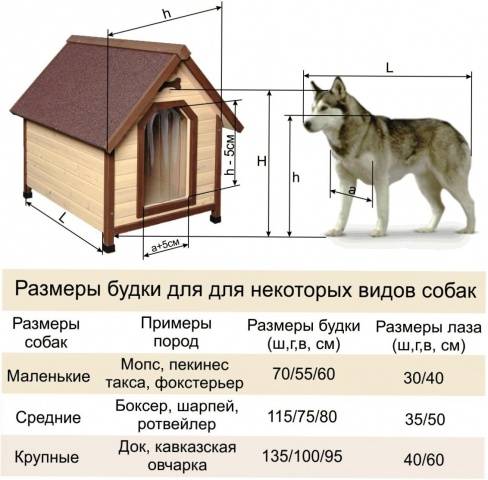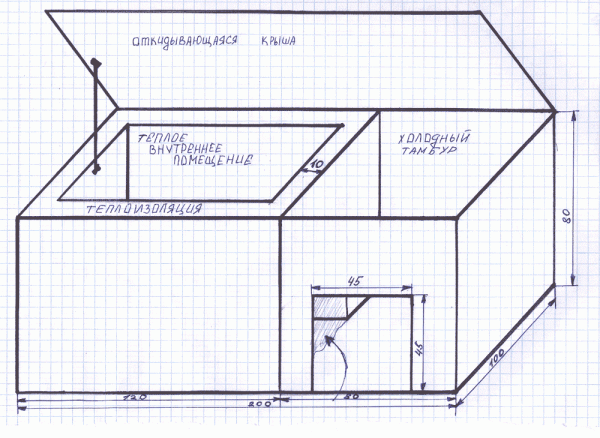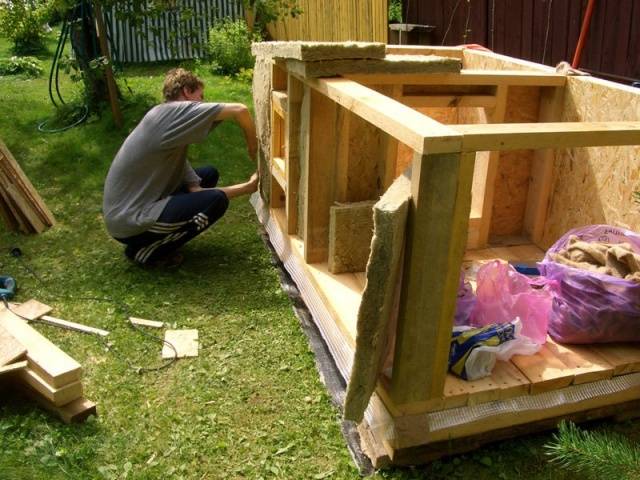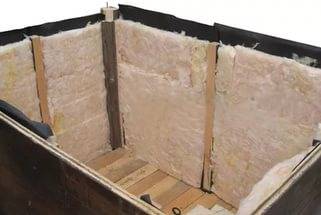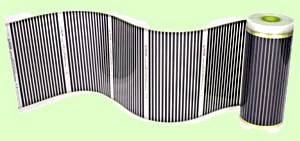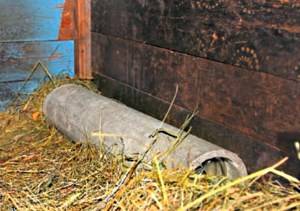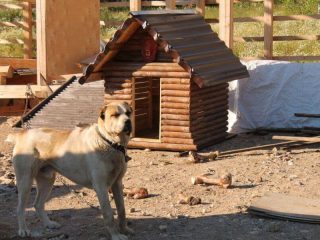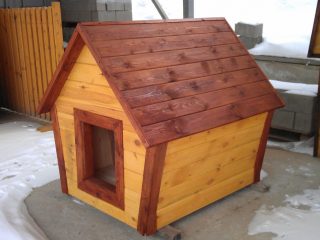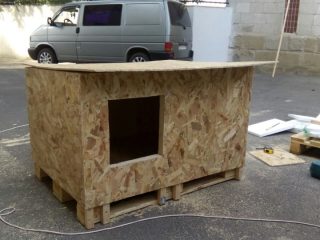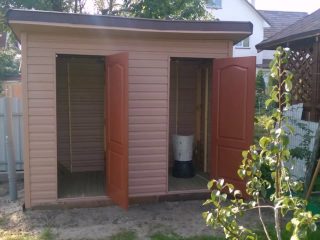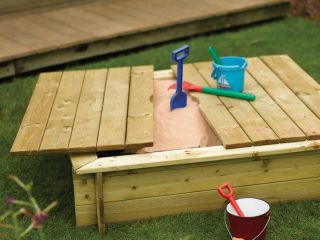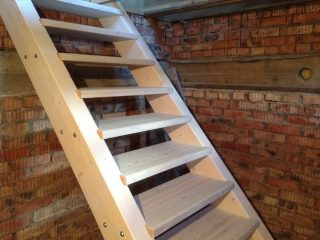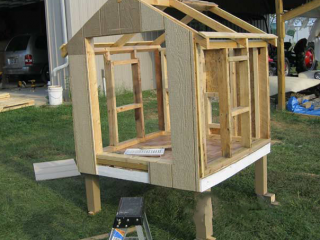Content
Building a doghouse is easy. Most often, the owner knocks a box out of the board, cuts a hole, and the kennel is ready. For the summer period, of course, such a house will suit a four-legged friend, but in winter it will be cold in it. Today we will look at how to make a warm kennel for a dog, inside which the animal will not freeze even in severe frosts.
Calculation of the dimensions of the dog kennel
The photo shows an example of the dimensions of the booth and manhole for different breeds of dogs. When making a dog kennel, you can use the dimensions from the table, or perform your own calculations.
The height of the kennel is determined by the growth of the dog at the withers, and an additional 15 cm is added. The stock is needed for winter bedding, and suddenly the animal will grow up. The depth of the booth is equated to the length of the lying dog with its paws extended in front of it. Measurement is taken between the tips of the paws and tail, and 15 cm is added to the result.
The calculation of the width of the house depends on its design. If the booth consists of one compartment, then its width is calculated according to the same principle as the depth. The dog should be comfortable to lie even across the kennel. In northern regions with long, harsh winters, it is wise to build a house with two compartments. The sleeping place is arranged in the second compartment from the manhole. Here the dog will sleep in winter. The dimensions of the sleeping compartment are calculated using the examples already given for determining the width and depth of the booth. The tambour is done in front of the sleeping compartment. Its size is selected arbitrarily according to the build of the dog. The animal must freely enter and leave the house.
It is important for the dog to properly organize the hole in the kennel. It is cut out in a rectangular or oval shape, calculated by the height of the withers of the animal, adding 10 cm. The width of the hole is made 8 cm more than the width of the dog's chest.
We draw up a drawing of a winter booth with a vestibule
The design of the kennel is simple, and you hardly need to draw up drawings for it. Just as an introduction, in the photo of the presented diagram, you can see an example of a kennel with two compartments and a folding roof.
If, nevertheless, you decide to build a doghouse according to the drawing, this is considered only a plus. The diagram will help you more accurately determine the size and shape of the house.
A few useful tips will help you design a drawing correctly:
- The inner space of the kennel should be enough for the dog for free deployment and comfortable sleep. It must be remembered that a young puppy will grow up over time, and he will need more space.
- For the construction of a warm kennel, it is better to take only boards. The wood retains heat well, is easy to process, and is also harmless to the dog.
- In the northern regions, it is still necessary to give preference to a booth with two compartments. During the design of the structure, double walls are provided, between which space is left for laying insulation.
- Alternatively, a warm dog house can be built inside the enclosure. Such solutions are resorted to by the owners who have acquired a large dog, which is not put on a chain.
- At the stage of drawing up the drawing for the booth, they are determined with the shape of the roof.For a large dog kennel, it is better to make a lean-to openable roof. In the summer, the dog will lie on it. A gable roof increases the space of the kennel, so it is preferable to build it on a small house.
Drawing up a drawing taking into account all the nuances, it will be possible to provide for all the little things, and the insulated dog booth will become a comfortable home.
Wooden booth manufacturing process
So, with the preparatory questions sorted out, it's time to start making a dog house:
- Any do-it-yourself dog booth begins to be made from the assembly of the frame. For these purposes, you will need a bar with a section of 50x50 mm. You can take blanks 10 mm thicker or thinner. Nothing will change significantly from this. From cut-to-size blanks, the frame of the bottom of the dog kennel is assembled. You should get a rectangular frame. For a large dog, it is better to reinforce the frame with additional jumpers so that the bottom does not bend. The finished frame is sheathed on top with a board 30 mm thick.
- The floor of the dog kennel is ready, we proceed to the walls. Vertical racks are attached from a similar bar from the corners of the bottom. Two additional elements are placed on the front wall for the manhole. If the kennel is designed for two compartments, then there will be a partition inside with another access hole. For him, you will have to install two more racks. From above, the racks are interconnected with a bar. The resulting frame will be the base of the kennel roof.
- The finished frame is sheathed with a board or wooden clapboard, and the bars must remain inside the house. They will still be needed when the walls are lined with insulation. At this stage, an internal partition is nailed from the board, and immediately a hole is cut out with an electric jigsaw on two walls.
- The roof structure of a warm house differs from the usual cold structure. Even in the case of the gable version, you will have to sacrifice the internal space by installing a ceiling inside the kennel. So, a piece of plywood is attached to the upper strapping of the frame racks, just from under the bottom of the frame. This will be the ceiling. On top of the plywood, a recess was formed, edged with a bar of the upper strapping. Roofing material is laid here, then polystyrene or mineral wool, again roofing material, and another sheet of plywood is nailed to the top of the frame. The result is a warm laminated ceiling, located between the bars of the frame of the upper trim of the struts.
- There is no point in making a gable roof for an insulated dog kennel, since the interior space will still not increase due to the ceiling. To build a shed roof, rafters from the board are fixed to the upper frame, forming a slope towards the rear wall. From above, a board is nailed to the rafters, on which the roofing material is laid.
- The resulting gaps between the roof and the body of the house are closed with platbands. To prevent heat from escaping from the doghouse, the manhole is closed with a tarpaulin or rubber curtain. To make it heavier, you can fix the load at the bottom.
But for now it is too early to hook the curtain and the roof, because the process of wall insulation is still ahead. And we will deal with this right now.
Insulating a doghouse
The question of how to insulate the dog booth should not be a problem, since any heat-insulating material will do. Mineral wool or foam pieces are usually used.
So let's get started:
- The insulation of the dog booth must be taken seriously, and first of all, raise it from the ground. The kennel is turned upside down. The bottom boards were nailed from the inside, so a frame made of timber remained outside. A layer of roofing material is laid inside the frame. Insulation is placed on top of it, and then roofing material again. Now this whole layer is hammered with a board. To raise the insulated bottom from the ground to the bottom frame, legs are nailed from pieces of timber with a section of 100x100 mm. They can be made with a height of about 100 mm.
- A doghouse with a warmed bottom is placed on its legs, after which they proceed to the walls.In the photo you can see that the insulation is attached to the inside of the walls. After sheathing the frame with a board, bars remained inside the dog kennel, forming cells. This is where the insulation is put in in the same way as it was done on the bottom. The inner lining can be made of plywood or OSB.
Now you can close the manhole with a curtain, put the roof on and paint the booth with dim oil paint or open it with varnish.
Electric heating of a dog house
Of course, insulating the dog booth for the winter is good. However, this may not always be enough. To heat the dog's home when the outside temperature drops below -30aboutC, electric heaters will be required.
Electric panels for booth heating
Panel heaters are well suited for heating a doghouse. The maximum heating temperature of the device is 50aboutC. The dog will not burn itself on the panel walls, so it is not necessary to cover it with a wooden grate. The thickness of the heater is about 20 mm. The panels are produced in two sizes: 590x590 mm and 520x960 mm. Heaters work silently.
Infrared film
An excellent heated booth will turn out if an infrared film is laid in the walls under the inner lining. It is usually used when arranging an electric underfloor heating. With the onset of severe frosts, it is enough to supply electricity to the film heater, and it will heat the walls of the booth to 60aboutC. The dog will be comfortable in any frost, and electricity consumption is minimal.
DIY heater
If a modern heated booth is too expensive for you, an alternative is offered. A piece of asbestos-cement pipe is cut along the length of the doghouse. A lampshade is cut out of a tin can. The size of the jar is selected so that it freely goes inside the pipe. The tin lampshade is attached to a 40 W bulb holder. The finished heater is inserted inside the pipe, the wire is taken out of the booth, and connected to the network through the machine. The entire structure and cable must be protected so that the dog does not bite them.
The video tells about making a homemade heater for a dog:
Conclusion
So, the insulated doghouse is completed. Now it remains to install it in its place, equip the site and launch the dog.
